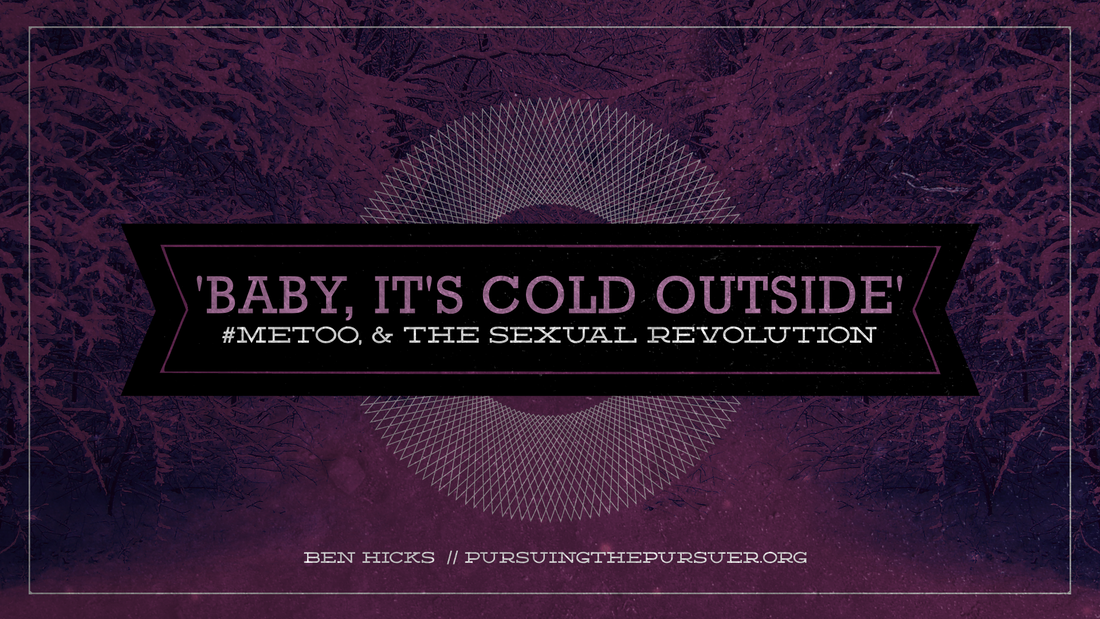|
“Oh boy, they’re at it again!” That was the reaction I saw all over social media when a radio station decided to stop playing “Baby It’s Cold Outside” for fear that it encouraged date rape. The ensuing discussion was interesting. Should the song be banned? Does it encourage abuse? Is this another example of #MeToo going overboard? Or, is this our demons finally catching up with us? Are we being oversensitive? Or has reckoning day finally come? To understand the answer, we have to go back to the 60s and 70s and the sexual revolution. The legalization of abortion and the invention of the Pill allowed people to have sex without consequences (or so they thought). Soon sex became as common as dating. During this time, sex before marriage went from being a social taboo, to being accepted, to being common, to being expected. Now a couple that doesn’t sleep together before marriage is viewed as being irresponsible, as jumping into something prematurely. This sexual revolution is still going on; it’s just so prevalent it’s not really considered “revolutionary” anymore. So what is the fruit of all of this? The fruit of this is #MeToo. #MeToo is what happens when a culture wakes up to the fact that abuse has become a rampant problem. God gave two safeguards to prevent sexual abuse. The first is marriage. God believes in consent. In fact, he’s so serious about it that he requires a legally binding ceremony, including a lifelong commitment to exclusivity, before approving of a sexual relationship (Hebrews 13:4). “But Ben! Abuse still happens in marriage.” Which is why God gave the second safeguard: self-sacrificial love. God not only wants sexual intimacy to be kept inside of marriage, and he wants it to be enjoyed by putting the needs and desires and well-being of the other person above oneself (1 Corinthians 7:2-5; Ephesians 5:25, 28-30). When you have a married couple saving themselves for each other and putting each other first, there is no sexual abuse. But the sexual revolution threw both of those out the door. It claimed commitment was unnecessary, that the pleasure of physical intimacy could be cut free from the commitment of marriage. They argued that sex was about you feeling good. The sexual revolution made the bold claim that sex had to do with bodies and not souls. It’s just a physical response that feels good, that’s it. Instead of God’s standards, they placed just one: consent. If both parties are okay with it, we’re good. I realize that sexual abuse happened before the sexual revolution, and I realize that sadly it has taken place even in the church. The wickedness of man is such that this problem will probably never go away completely. However, the sexual revolution was like wagon-loads of hay thrown onto the smoldering fire of man’s sinful desires. People can’t seem to control themselves under the current system, people thought, so let’s just get rid of the rules. We’ll just make sure people consent beforehand, and we’ll be good. That should fix the problem. But God created reality like a giant spring. The harder you push down on it the harder it will push back (Galatians 6:7-8). The sexual revolution was man pushing the boundaries on what God had created, and the #MeToo movement is God’s creation pushing back. We now live in a world where consent has been shown to be a wholly inadequate answer. How do you define consent? The whole nature of sex is that a man is pursuing a woman. Song of Solomon discreetly rejoices in this very thing: a husband’s romantic, sexual pursuit of a his wife. But how do you pursue when you constantly have to ask for permission? How many times can you ask before you’re harassing? And how do you prove consent later? Some offer the solution of apps that allow you to check off what you want and don’t want. Some guys have begun taking videos of women saying they’re okay with sex before beginning. Lawyers agree neither is legally binding. Public figures have sought to bring awareness to the importance of never going beyond what the other person feels comfortable with. But so many questions still remain. For example, if an attractive actress decides to sleep with a director to improve her chances at getting a role, is that abuse? Is it abuse if the director requires an actress to sleep with him to get a role? What if he strongly suggests? What if he simply asks? Hints at it? What if a woman walks away from an encounter and feels taken advantage of after the fact? We have decided someone who is drugged or drunk can’t give their consent. What if a girl goes to a party to get smashed and wants to hook up (I’ve never been to such a party, but my general impression of the party scene is that people go there to put mind-altering substances into their body and then have a one night stand)? Should a drunk guy say to a drunk girl asking him for a fun evening: “Sorry, I can’t be with you. You are drunk and can’t give your consent. Maybe some other time when we’re both sober?” We can’t have it both ways. We can’t dishonor each other and yet seek to do it nobly. The spring keeps pushing back. So back to “Baby It’s Cold Outside.” What do I think of the song? It’s a terrible holiday song! In my opinion it’s second only to Santa Baby (honestly, I don’t know what’s worse, that someone sat down and wrote a song about seducing Santa Clause, or that it has become so popular in America) ! “Baby It’s Cold Outside” is a song about a guy trying to pressure a woman to stay a little longer and her being worried what other people will think. The implication is clear: he wants to sleep with her, and she feels uncomfortable and wants to leave. So he pushes, and persuades, and she resists, and is concerned that he might be drugging her, and in the end they both agree that “It’s cold outside.” Did he abuse her? Should he be proud that he convinced her to stay, or should he be ashamed he took advantage of her? From a Christian’s perspective, he took advantage of her. But from the world’s perspective, did he? Should he have taken “no” for an answer, or as long as he doesn’t physically force her, is he okay? If she walked away deciding it was a good time, is he good? What if her parents do get upset and the neighbors do start talking and she decides it was a bad idea after all, is he a monster now? We abandoned honor and integrity for a good time. Commitment gave way to cheap thrills. Black and white lines became fuzzy, and not surprisingly those fuzzy lines began to be pushed. When marriage and sacrificial love are replaced with a message of ‘do whatever you want,’ and when souls are only seen as bodies, it’s just a matter of time before we have to pay the price. And the price has been horrific. And this is why “Baby It’s Cold Outside” has become such a lightning rod. It’s a mirror of the conversation our culture is having right now. What counts as abuse? What counts as consent? How can we take advantage of each other in such a way that no one feels taken advantage of? The answer America is slowly discovering is we can’t. God’s way really is better than ours.  Ben Hicks went to Bob Jones University for college and stayed on for grad work, recently graduating with his Master of Divinity. Ben is the Young Adults Pastor and oversees the Single Focus ministry at Colonial Hills Baptist Church. Follow him on Twitter @HicksBen
2 Comments
Don Johnson
12/22/2018 02:41:39 am
Good points Ben. Reminds me of the theme of a book I am reading, *Love Thy Body* by Nancy Pearcey. She argues (and correctly, I think) that idolatrous worldviews dehumanize people. This gives rise to all kinds of abuses, most of them divorcing the soul from the body, so people feel free to indulge their fleshly desires but think there will be no spiritual consequences. 1Co 6:16 Or do you not know that the one who joins himself to a prostitute is one body with her? - there is far more to sexual union than two bodies having a good (or not so good) time.
Reply
Carrie Banks
1/5/2019 08:33:33 pm
Excellent
Reply
Leave a Reply. |
Popular ArticlesThe Problem With Christian Trump Supporters
How to Have Personal Standards Without Being a Legalist The Heart of Modesty Stop Trying to Reach Millennials AuthorsLike our Facebook page to keep up with the latest articles!
Categories
All
Archives
November 2020
|


 RSS Feed
RSS Feed
